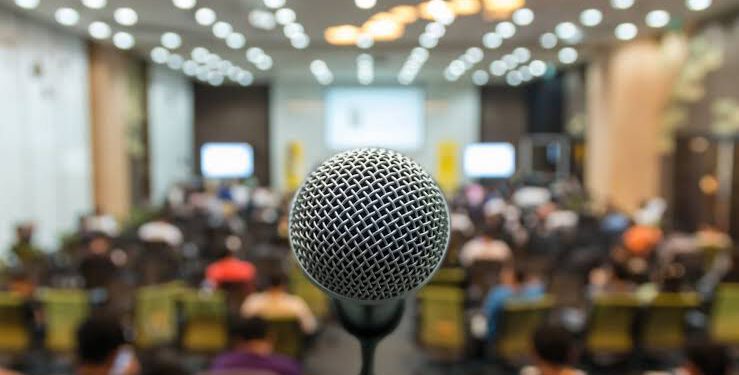Public speaking is generally deemed the act of making a speech to a live audience with the intention to educate, actuate, inform, persuade or entertain. This goes without saying that despite the very obvious simplicity of the entire concept of public speaking, genuinely, speaking in public is not necessarily the same as public speaking; and this is exactly where most Nigerian leaders/politicians miss it.
Certainly, for a person to thrive in politics, such an individual can go with the barest minimum amount of confidence. Hence, most of these politically inclined individuals, without hassle, speak in public, using the same quality of confidence with which they delved into politics.
By this logic, any person at all, even with a meager-sized confidence may speak in public. However, there is the need to clarify that being a public speaker transcends the point of being able to speak in public to the point of ding so with impact, solidity, substance and most importantly, with style. Just as you have guessed, this requires more than just confidence. Luckily, public speaking is a skill that can be learnt.
A leader has the sole responsibility of directing the affairs of a people. This responsibility requires a huge bank of skills that a leader must possess. These skills range from relationship building, agility and adaptation, innovation and creativity, decision making, follower motivation, conflict management to critical thinking. Although, the most underrated of these skills, especially in Nigeria, is effective communication which is deeply rooted in the act and art of public speaking.
Effective communication involves sending a message that is received as intended by the sender. No one has a greater need for his message to be comprehended in totality and accuracy more than a person who holds a leadership position.
A leader needs to communicate effectively; hence, his need to be more than a person who speaks in public but actually be a public speaker.
The people-centric nature of a democratic society like Nigeria makes it absolutely necessary for an intending political office holder to interface with the electorates during the process via public campaigns, manifestoes, political debates and interviews.
With the closeness, of the upcoming 2023 elections, it is not uncommon to see all of this.
What is however uncommon is to see an intending political office holder, in any of the aforesaid scenarios, speak with the finesse of a true public speaker— keen attention to message, intonations, enunciation, postures, gestures, vocal resources, appearance and timing.
Even after being elected, a leader is consistently required to physically communicate with the people in situations ranging from tragedy to celebrations. A leader who possesses great public speaking skills would own the heart of the people due to his knowledge of methods with relation to public oral communication.
Throughout the history of humanity, certain leaders have stood out just by reason of their prowess in oral communication. Some of these leaders include Barrack Obama, Martin Luther King, Franklin D. Roosevelt, Adolf Hitler, Nelson Mandela, and our own Professor Yemi Osinbajo.
“I have a Dream”— Martin Luther King Jr. gave a speech on August 28, 1963, calling for the abolition of racism in America as well as for civil and economic rights. This outstanding illustration of excellent public speaking served as a catalyst for the civil rights movement, which led to the Civil Rights Act’s passage and the equal treatment of African-Americans. This remains one of the finest speeches in American history.
Similarly, Professor Yemi Osinbajo has had stellar moments in recent times, making waves on the digital space with speeches delivered with finesse to inspire hope and instill confidence. The most recent of these is his interest declaration for the 2023 presidential candidacy.
The greatest public addresses have changed the course of history by inspiring millions and ingraining bravery in people to act during difficult times. This is why the importance of public speaking in leadership cannot be overstated. The best leadership found anywhere in the world cannot from great public speaking, among other factors.
As the 2023 elections approach, it is of utmost importance that people begin to assess every aspirant’s public speaking ability as one of the yardsticks of determining competence. From the presidency to local government seats, no one who lacks the skills of decent oral communication should be allowed to take the seat— unless, of course, if they’re genuinely vocally impaired or deficient in speech.
In conclusion, the leader is the face of every community. Usually, the quality of a leader is deemed a true reflection of the quality of the people. The ultimate key to producing leaders who are skilled in public speaking is to develop the public speaking culture amongst ourselves as a people. This is the true way forward.
•Erhuvwu Akpomerha is a final year student of the Department of English, Faculty of Arts, Lagos State University.















